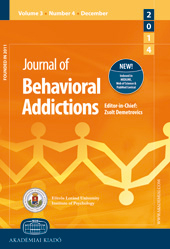A preliminary investigation into the prevalence and prediction of problematic cell phone use
A preliminary investigation into the prevalence and prediction of problematic cell phone use
Author(s): Peter SmetaniukSubject(s): Psychology, Behaviorism, Substance abuse and addiction, Health and medicine and law, ICT Information and Communications Technologies
Published by: Akadémiai Kiadó
Keywords: technological addictions (TA); problematic mobile phone usage; behavioral addictions;
Summary/Abstract: Likening mobile phone use dependency to the classification of excessive behaviors may be necessarily equivalent in seriousness to previously established addictions such as problematic computing or excessive gambling. The aim of the study explores into the behavior of excessive use of mobile phones as a pathological behavior. Methods: Two studies investigated criteria for problematic mobile phone usage by examining student (Study 1, N = 301) and nonstudent (Study 2, N = 362) responses to a set of adapted mobile phone addiction inventories. Study 1 investigated cell phone addiction inventories as constructs designed to measure problematic cell phone use. Additionally, Study 2 sought to predict age, depression, extraversion, emotional stability, impulse control, and self-esteem as independent variables that augment respondents’ perceptions of problematic use. Results: The results from Study 1 and Study 2 indicate that 10 to 25% of the participants tested exhibited problematic cell phone usage. Additionally, age, depression, extraversion, and low impulse control are the most suitable predictors for problematic use. Conclusions: The results of the two studies indicate that problematic mobile phone use does occur and ought to be taken seriously by the psychological community. Presently, there is limited data providing conclusive evidence for a comprehensible categorization of cell phone addiction, as well as a unified explanatory model specific to problematic mobile phone use. Studies such as this one may contribute substantial findings, adding scientific significance, and offering a valuable submission for the ongoing progress of creating intervention frameworks relative to “virtual addictions”.
Journal: Journal of Behavioral Addictions
- Issue Year: 3/2014
- Issue No: 1
- Page Range: 41-53
- Page Count: 13
- Language: English

